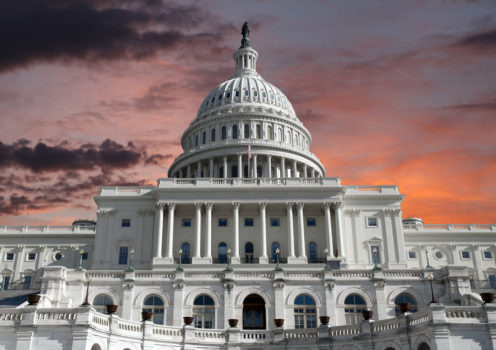DC Shuttle …
 DeVos Declines to Testify Before House Panel; Subpoena Possible. U.S. Education Secretary Betsy DeVos turned down House Education Committee Chair Bobby Scott’s (D-VA) request that she testify in front of the committee in regard to the Education Department’s role in the erroneous collection of student loans from former Corinthian College students. House Democrats scheduled a hearing for Nov. 19 on the department’s “refusal to provide debt relief” to students “who were defrauded” by the now defunct for-profit Corinthian Colleges, and Scott has threatened DeVos with a subpoena if she denies his request to appear voluntarily. In a letter sent to Scott, the secretary wrote that while she refuses to appear at the hearing, she would have “a conversation, either in person or over the phone, at [Chairman Scott’s] convenience to discuss borrower defense claims.” Read more in Politico.
DeVos Declines to Testify Before House Panel; Subpoena Possible. U.S. Education Secretary Betsy DeVos turned down House Education Committee Chair Bobby Scott’s (D-VA) request that she testify in front of the committee in regard to the Education Department’s role in the erroneous collection of student loans from former Corinthian College students. House Democrats scheduled a hearing for Nov. 19 on the department’s “refusal to provide debt relief” to students “who were defrauded” by the now defunct for-profit Corinthian Colleges, and Scott has threatened DeVos with a subpoena if she denies his request to appear voluntarily. In a letter sent to Scott, the secretary wrote that while she refuses to appear at the hearing, she would have “a conversation, either in person or over the phone, at [Chairman Scott’s] convenience to discuss borrower defense claims.” Read more in Politico.
Trump Administration Withdraws Request to Stop $100K Fine Over Violation of Court Order. The Trump administration withdrew its request that a federal judge reconsider a $100,000 fine against the Education Department and Secretary DeVos, who were ruled to be in contempt for violating a court order to halt the collection of Corinthian College students’ loans. The administration originally wrote that the fine was not justified and that the Education Department was “in full compliance with the preliminary injunction and have remediated the harm to affected borrowers.” However, the Trump Administration withdrew its motion, writing that “the defendants cannot fairly represent that they are in ‘full compliance’ with the Court’s preliminary injunction.” It was concluded, however, that after further review of the department’s actions, it may be able to renew its request to the judge. Read more in Politico.
Senate Democrats Push to Reauthorize Funding for Minority Serving Colleges. Nearly a month after mandatory funding for minority serving institutions expired, Sen. Ben Cardin (D-MD) took to the Senate floor to request a unanimous passage of the FUTURE Act to extend the money for two years. Senate Health, Education, Labor and Pensions Committee Chair Lamar Alexander (R-TN) objected to the vote for a third time and instead proposed to address the funding issue through a unanimous passage of his higher education bill package. Cardin responded with an objection of his own that stymied the chair’s request for unanimous consent. On the same day, a group of 38 senators lead by Sen. Doug Jones (D-AL) and Sen. Jon Tester (D-MT) sent a letter to Senate Majority Leader Mitch McConnell (R-KY) and Minority Leader Chuck Schumer (D-NY) calling on them to pass the FUTURE Act. Read more in The Washington Post and Diverse: Issues In Higher Education.
Higher Ed Organizations Object to Ed Department Foreign Gift Reporting Request. The American Council on Education and 29 other higher education organizations sent a letter to the Department of Education expressing their concerns about the proposed form for collecting information about donations and gifts valued over $250,000 from foreign sources as introduced by the department in September. The letter suggests that the department’s new foreign gift disclosure guidelines go well beyond the scope of the law as it is established in the Higher Education Act (HEA). The group wrote that, “the manner in which other aspects of the proposed information collection is organized and written makes the information collection subject to differing reasonable interpretations, with some of those interpretations also well beyond what [the HEA] requires.” Read more in Inside Higher Ed.
New Ed Dept Guidelines Give Colleges More Flexibility on Course Length. The Education Department published revised governing guidelines on how it will measure the length of courses for federal financial aid purposes. The new guidance relaxes the definition of what is considered a “standard term,” such as a semester, trimester or quarter, in higher education. Institutions that use such terms will face simpler and less complex rules for how they can award federal financial aid than those who use nontraditional terms. The department touts the policy change as a fix to the “needlessly rigid traditional requirements for term length” and an incentive for innovative academic programs.
We publish the DC Shuttle each week featuring higher ed news from Washington collected by the New England Council, of which NEBHE is a member. This edition is drawn from the Higher Education Update in the Council’s Weekly Washington Report of Nov. 11, 2019. For more information, please visit: www.newenglandcouncil.com.
[ssba]
